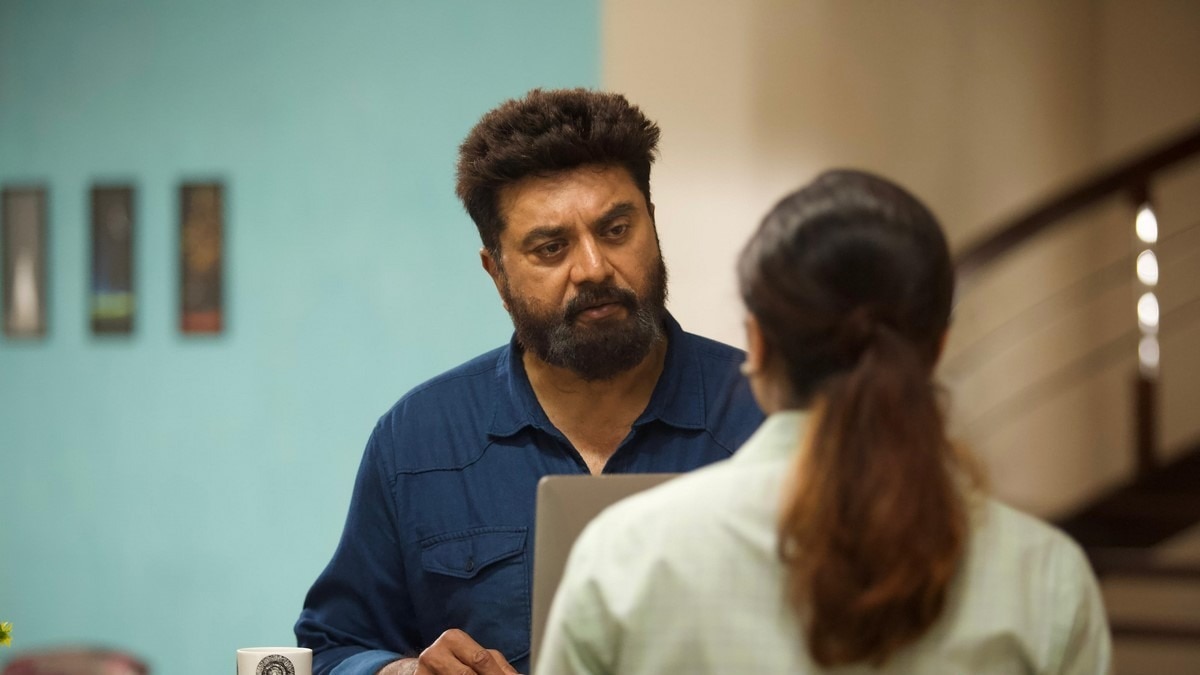Movie Reviews
Movie Review: Jamie Foxx leads a crowd-pleasing courtroom drama in ‘The Burial’

Jamie Foxx deploys his movie star charm judiciously and skillfully as a litigator with swagger to spare in “ The Burial,” a very entertaining courtroom drama.
Foxx is one of those actors, blessed with an allure and glamour that runs so deep that it’s almost tempting to dismiss a performance like this as one that’s natural. It’s one of those compliments that’s rotten at its core — of course he, or Clooney, or whomever, is good at being slick and appealing, right? If it looks effortless, we assume it is, denying them the work that goes into every role.
The same could be said for “The Burial,” which is glossy, appealing and goes down suspiciously easy. Is there a catch or did director and co-writer Maggie Betts just prove her commercial chops in her sophomore feature? (It’s the latter.) Just take a look at the poster used for its marketing campaign —- a little retro, a little cheesy, and a lot self-aware. This movie and everyone involved knows what it is.
In a probably skewed memory of the mid-90s, these sort of mid-budget “rousing courtroom dramas” seemed ubiquitous, but have gone the way of the rom-com at least in big theatrical releases. “The Burial” will be in some theaters for a week, before coming to your living room on Oct. 13 on Prime Video.
This story is a classic David vs. Goliath one, in which a Biloxi funeral home owner, Tommy Lee Jones as Jeremiah O’Keefe, goes up against a billionaire, Raymond Loewen (Bill Camp). Both were children of funeral parlor owners, but O’Keefe stayed local while Loewen took the so-called “death care” business corporate. He made a fortune acquiring funeral homes in Canada and then the United States in anticipation of a “golden age of death,” in which the baby boomers start meeting their ends in mass numbers. “The Burial” is loosely based on a true story, which was chronicled by Jonathan Harr in The New Yorker in 1999.
Betts focuses her lens on Foxx’s character, Willie E. Gary, a self-made success in personal injury law, who has never lost a case and doesn’t plan to. Jeremiah’s case is a contract one but a young associate played by the always appealing Mamoudou Athie convinces him that he’s going to need a lead counsel who is Black if they’re going to have a chance. The trial has been set for a poor, largely Black area, and Jeremiah’s longtime lawyer, Mike Allred (Alan Ruck, playing a character who would probably be a Con-Head), is an obvious racist. He’s working on it, he says chillingly to a team of Black lawyers.
When Willie does finally agree to go out of his comfort zone and take on a different kind of case (his ego stoked by the promise that this could make him as famous as Johnnie Cochran), there is a steep and humbling learning curve and a formidable opponent in Jurnee Smollett’s Ivy League-educated lawyer representing the Loewen Group.
Betts shares a screenwriting credit with Doug Wright, the Pulitzer and Tony-winning playwright, who has been with the project for years, with Alexander Payne once attached to direct. Betts was coming off a promising, but small, debut — the religious drama “Novitiate,” with Margaret Qualley and Melissa Leo. “The Burial” too is assured and straightforward, and faces questions about race and privilege and inequality head on. This story is about two older white men fighting about a contract, sure, but Betts and Wright expand its scope with sensitivity and nuance. Like many good courtroom dramas before it, this case is bigger than just these two guys.
Smollett’s Mame is the big invention of the movie, which doesn’t grate the way it usually does when screenwriters add a fictional, exceptional woman to diversify a too-male story. Mame is not a one note character — she is brilliant and accomplished but also keenly aware that she can’t stumble, falter or lose her cool the way her male counterparts can. Sometimes you even forget that you really shouldn’t be rooting for her to win, which is a shrewd touch for a movie with a pretty obvious conclusion and an easily hateable villain.
But this show belongs to Foxx, and it’s a fun feast to see him grandstand and doubt himself and charm all kinds of jurors and make us feel empathetic for a guy who is himself ostentatiously wealthy, no matter if it was easy for the actor or not.
“The Burial,” an MGM/Amazon Studios release in theaters Friday and streaming Oct. 13, is rated R by the Motion Picture Association for “language.” Running time: 125 minutes. Three stars out of four.

Movie Reviews
Sonic the Hedgehog 3 (2024) – Movie Review

Sonic the Hedgehog 3, 2024.
Directed by Jeff Fowler.
Starring Ben Schwartz, Jim Carrey, Keanu Reeves, Idris Elba, Colleen O’Shaughnessey, Krysten Ritter, James Marsden, Tika Sumpter, Alyla Browne, Lee Majdoub, Natasha Rothwell, Shemar Moore, Adam Pally, Tom Butler, James Wolk, Jorma Taccone, Cristo Fernández, and Sofia Pernas.
SYNOPSIS:
Sonic, Knuckles, and Tails reunite against a powerful new adversary, Shadow, a mysterious villain with powers unlike anything they have faced before. With their abilities outmatched, Team Sonic must seek out an unlikely alliance.

Watching Sonic the Hedgehog 3 is a vindicating experience. For years (possibly decades by now), whether it be the first two Sonic the Hedgehog movies, Bayformers, and plenty of other examples that exist out there, there has always been a firm feeling among many that if these filmmakers and studios forced aside the damn human characters and focused on who viewers are here to see (which doesn’t mean crowded, embarrassing fan service), the results would likely be worthwhile.
This might be the first live-action/CGI hybrid feature of its kind that almost entirely does away with its already established human characters (discounting staples of the game people actually want to see, such as Jim Carrey’s returning Dr. Robotnik, once again with ample screen time) and trust that there is enough compelling story within the source material to adapt sincerely that fans and nonfans alike will come away satisfied.

Granted, in the case of Sonic the Hedgehog, director Jeff Fowler (who has directed all three of these firms) didn’t have much to work with since the Sega Genesis games weren’t necessarily known for story or characterization (as the games branched out into different gameplay mechanics and evolved with the industry’s technology, so came attempts at telling stories within them), somewhat forced to bring human characters into a cinematic adaptation. However, over the previous two films, he and screenwriters Pat Casey, Josh Miller, and John Whittington have gradually and gracefully brought in more nonhuman characters to join forces with the lightning-fast Sonic (voiced by a returning Ben Schwartz), such as tech gadget specialist fox Tails (voiced by Colleen O’Shaughnessey) and brawling, literal-minded Echidna warrior Knuckles (another amusing voiceover performance from Idris Elba.)
This installment brings Shadow the Hedgehog into the mix, bursting with chaos energy and hell-bent on revenge-fueled destruction. Toss in a long-lost grandfather Robotnik (also played by Jim Carrey, opening up an entire separate dimension for his reliably impressive brand of physical comedy and strange noises), and the filmmakers now have enough characters to where the likable but also intrusive human additions can be pushed off into the background, making an appearance for cameo purposes or when it actually fits the story being told. Despite that, some human cameos don’t need to be here, aren’t funny, and feel contractually obligated more than anything. For the most part, though, everything is much more tolerable and sensible.

Aside from the prologue, when Sonic’s human best friend Tom (James Marsden) and his partner Maddie (Tika Sumpter) pop up, it’s not solely for jokes but typically to push forward a specific central theme regarding loved ones, dealing with anger, and important choices in life that directly correlate to with what Shadow (voiced by Keanu Reeves in John Wick mode, which is pleasantly fitting for the character) is going through.
Having been contained and studied for roughly 50 years upon being discovered in a meteorite crash, Shadow has escaped and is obsessed with bringing forth chaos and ensuring others feel his pain. Such torment movingly plays out in flashbacks, revealing that while he was frequently experimented on, Commander Walters’ daughter Maria (Furiosa‘s Alyla Browne, already a notable effusive presence from these two movies alone) occasionally broke him out to play and developed a close bond. She became the only bright spot in his experience on Earth, meaning that one doesn’t have to be a rocket scientist to figure out that something tragic eventually happened.

It appears that whoever is cooperating with Shadow is also utilizing whatever is left of Dr. Robotnik’s technological weapons. The mad scientist turns out to still be alive and has put on a few pounds (although not quite as heavy as the character’s depiction in the video games, but considering there are more movies to come, one presumes he might not be done gaining weight) while watching Spanish soap operas and chilling with his loyal minion Agent Stone (Lee Majdoub.) Enemies decide to join forces to discover who is behind the commotion temporarily. Agent Stone realizes that Sonic and company aren’t just a team but also friends, a dynamic he wishes he could have with Dr. Robotnik. As previously mentioned, Dr. Robotnik discovers that his grandfather (just as diabolically insane and intelligent) is alive, paving the way for another familial dynamic and some nutty off-the-wall chemistry between two Jim Carreys.
And while there are unquestionably brief stretches of horrendously delivered dramatic dialogue from supporting characters and cringe gags (dancing across a hallway filled with lasers), there is a moving-through line of heroes and villains forced to look within themselves and determine who they ultimately want to be, especially as betrayals occur. Perhaps most importantly, it leads to impressively staged action that is epic in scale, showcasing Sonic and Shadow beating each other senseless across the entire planet and into outer space, amplified by genuinely emotional stakes regarding love and loss.

With Sonic the Hedgehog 3, Jeff Fowler and company have found the right balance of humor (even Jim Carrey feels reinvigorated and energized more than in the first two, up for the goofy acting challenge presented that is right inside his slapstick wheelhouse, while also simply given mostly funnier material to work with) and frenzied action elevated by strong, vibrant CGI (this is unquestionably one of the better-looking special-effects extravaganzas of recent memory) alongside an engaging story. There is a case to be made that Shadow’s back story could have been even longer and not limited to a couple of flashbacks, but the right characters here are put front and center, which makes all the difference for a Sonic adaptation to click.
Sonic the Hedgehog 3 is aware it doesn’t always “gotta go fast,” occasionally slowing down to ensure we care about these characters while laying out its themes with affecting sincerity.
Flickering Myth Rating – Film: ★ ★ ★ / Movie: ★ ★ ★
Robert Kojder is a member of the Chicago Film Critics Association and the Critics Choice Association. He is also the Flickering Myth Reviews Editor. Check here for new reviews, follow my Twitter or Letterboxd, or email me at MetalGearSolid719@gmail.com
https://www.youtube.com/watch?v=embed/playlist
Movie Reviews
The Smile Man review: Sarath Kumar's film fails to realise its full potential

A serial killer on the loose. The killer has a pattern – he/she brutally maims the target, leaving them with a gory smiling face. Enter a high-ranking police officer diagnosed with Alzheimer’s, who has only one year before his memory fades forever. Now, this is a story that has the potential to be developed into a high-octane thriller with twists and turns. But, does Sarath Kumar’s 150th film, The Smile Man, live up to expectations? Let’s find out!
Chidambaram Nedumaran (Sarath Kumar), a CBCID officer, is recuperating from an injury. To make matters worse, he’s been diagnosed with Alzheimer’s and has just one year left to preserve his memories. Before his injury, he was involved in the investigation of The Smile Man case. While he is trying to adapt to his new lifestyle with memory loss, a series of similar killings take place, forcing Chidambaram to reopen the case.
This time, however, Chidambaram must battle his declining health while investigating the case to unmask the killer. Why was the Smile Man case closed before his injury? Is there anything more than what meets the eye? Who is the killer, and what is their motive?
Director duo Syam and Praveen’s The Smile Man has a solid story at its core, though it might remind you of thrillers, Ratsasan and Por Thozhil. A serial killer story has a predictable template, but a film can stand out from the crowd because of the way the story and screenplay are treated. That way, The Smile Man is an illogical thriller that reeks of amateur making. The killer leaves a smiling scarred face on the victims and the pattern should ideally shock the audience. But, the poor prosthetic makeup hardly makes it look menacing.
Here’s the trailer:
The portrayal of journalists in The Smile Man is poor, anf the dialogue is one of the film’s biggest drawbacks. For example, the CBCID officer casually throws around words like ‘copycat killer’ without any solid basis. The reasons given are so futile that it forces you to not take the characters seriously.
The killer’s face is hidden for half of the film, and when it is eventually revealed, it fails to deliver any excitement. Similarly, the killer’s motive and his backstory are told and not shown. The justification hardly makes sense and one could spot a lot of logical loopholes.
TThe film’s music tries to evoke emotions but falls flat. Before each murder, a growl indicates what’s coming, and before the killer strikes, the music warns you. This removes the element of surprise, which is crucial to a good thriller.
Sarath Kumar is the only actor who gives his all in an attempt to salvage this poorly executed story. The rest of the performances, except for those by George Maryan and Kalaiyarasan, make little impact.
The Smile Man is a lost opportunity considering the potential it showed. If only the screenplay had been handled better, the film could have had a much stronger impact.
2 out of 5 stars for The Smile Man.
Movie Reviews
Movie Review: “Mufasa,” everything we didn’t need to know about “The Lion King”

The CGI animated savannahs, rivers and rock formations of Africa are photo-real, and the animals populating it have never been more realistically rendered than they are in “Mufasa: The Lion King.”
Disney felt the need to have the lions, warthog and meercat’s lips move when they sing, which is saying something.
But let’s keep this review short and not-exactly-sweet, unlike this boardroom-ordered prequel to one of Disney’s most popular intellectual properties. “Mufasa: The Lion King” never makes the case that it’s a story that needed to be told or a movie that needed to be made.
It’s about how Mufasa got separated from his birth-parents’ pride of lions, and joined another, becoming “brothers” with the lion cub who “saved” him, but who will come to be called “Scar.”
So the object of this prequel is to show how Mufasa became Lion King and how Scar got his scar and became the bitter rival in their pride.
The “story” is framed as a “story” Rafiki the ape (John Sani) tells Simba’s cub, and that cub’s protectors/babysitters, Timon (Billy Eichner) and Pumbaa (Seth Rogen).
The tale is of another coming-of-age quest, with two young-lions on their own this time, paired-up, depending on each other, on the run from a pride of albino lions led by the killer Kiros (Mads Mikkelsen).
There are new songs of a far more forgettable nature than those from the animated classic “The Lion King.”
“The circle is broken,” he growls, and we believe him.
There are harrowing moments of drama in their quest, but there’s precious little humor to the movie, all of it provided by the same duo who have always been the comic relief, Timon and Pumbaa.
“We’ve been singing ‘Hakuna Matata’ since forever!”
“Who hasn’t?“
The messaging, about taking in “strays,” and that “To be lost is to learn the way,” is weak tea.
Story failings aside, it’s not a bad movie. But “Mufasa” never lets us forget the limited-entertainment-value of the entire undertaking. Oscar winner Barry Jenkins (“Moonlight”) was hired to direct, but aside from a few voice casting decisions (Keith David, Anika Noni Rose, with Aaron Pierre and Kelvin Harrison, Jr. as Mufasa and Taka/Scar), he brings nothing to this that makes a difference.
Disney’s tech/animators telling their bosses that “Yes, we can make it look like a movie with real singing lions and bathing hippos on the veldt without using real animals or shooting on location” is no justification for showcasing that technology.
Story matters, and this one didn’t need to be told.

Rating: PG, some violence
Cast: The voices of Aaron Pierre, Kelvin Harrison, Jr., Tiffany Boone, John Kani, Mads Mikkelsen, Thandiwe Newton, Keith David, Billy Eichner and Seth Rogen.
Credits: Directed by Barry Jenkins, scripted by Jeff Nathanson, based on characters from Disney’s “The Lion King.” A Walt Disney release.
Running time: 1:58
-
/cdn.vox-cdn.com/uploads/chorus_asset/file/24924653/236780_Google_AntiTrust_Trial_Custom_Art_CVirginia__0003_1.png)
/cdn.vox-cdn.com/uploads/chorus_asset/file/24924653/236780_Google_AntiTrust_Trial_Custom_Art_CVirginia__0003_1.png) Technology6 days ago
Technology6 days agoGoogle’s counteroffer to the government trying to break it up is unbundling Android apps
-

 News1 week ago
News1 week agoNovo Nordisk shares tumble as weight-loss drug trial data disappoints
-

 Politics1 week ago
Politics1 week agoIllegal immigrant sexually abused child in the U.S. after being removed from the country five times
-

 Entertainment1 week ago
Entertainment1 week ago'It's a little holiday gift': Inside the Weeknd's free Santa Monica show for his biggest fans
-

 Lifestyle1 week ago
Lifestyle1 week agoThink you can't dance? Get up and try these tips in our comic. We dare you!
-
/cdn.vox-cdn.com/uploads/chorus_asset/file/25672934/Metaphor_Key_Art_Horizontal.png)
/cdn.vox-cdn.com/uploads/chorus_asset/file/25672934/Metaphor_Key_Art_Horizontal.png) Technology3 days ago
Technology3 days agoThere’s a reason Metaphor: ReFantanzio’s battle music sounds as cool as it does
-

 Technology1 week ago
Technology1 week agoFox News AI Newsletter: OpenAI responds to Elon Musk's lawsuit
-

 News4 days ago
News4 days agoFrance’s new premier selects Eric Lombard as finance minister


















